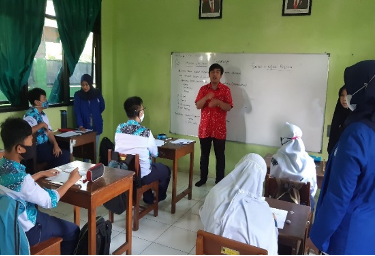Main Article Content
Abstract
Adolescents with intellectual disability who do not have intelligence abilities are vulnerable to sexual harassment when their reproductive systems are developing. Consequently, they lack a comprehensive understanding of reproductive health. This service aims to provide assistance to 38 intellectual disability teenagers at SLB N Semarang. Assistance is carried out through the stages of strengthening cooperation, pre-test, film screening, brainstorming, and post-test. The outcomes revealed that there was an increase in knowledge after the intervention, which took the form of showing a short film about pregnancy prevention (p-value 0.009), with low program effectiveness (gain score 0.29).
Keywords
Article Details

This work is licensed under a Creative Commons Attribution-NonCommercial 4.0 International License.

